what is the healthest oil to bake with?
Which cooking oil is the healthiest?
(Image credit:
Science Photo Library
)
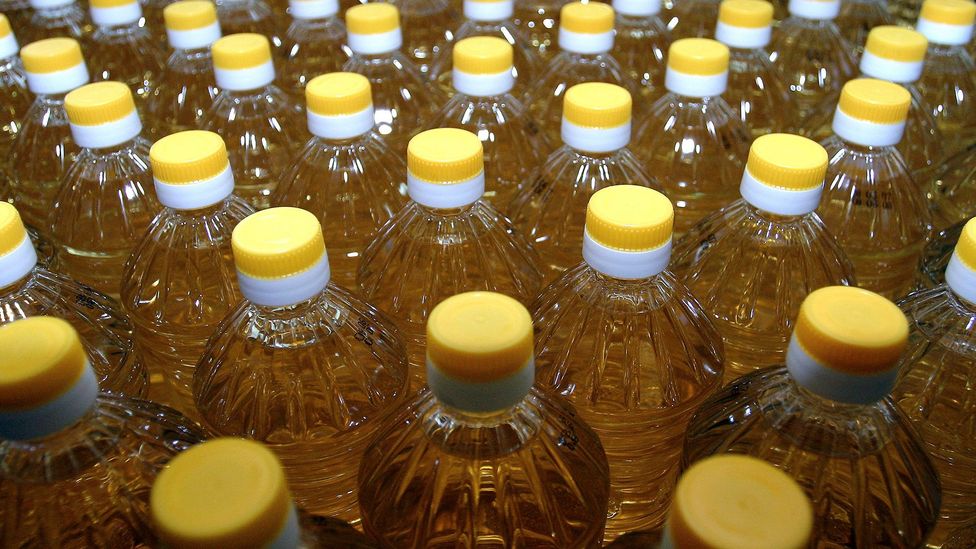
Oils are all packed with fat and calories, but their chemistry – and effect on our health – can be very unlike.
C
Cooking oils are a kitchen staple. But there'south a lot of conflicting information regarding how salubrious each of them are. With so many on the shelves – from kokosnoot to olive, vegetable to canola, avocado to rapeseed oil – how practise we know which ones to use, and if we should be fugitive whatsoever birthday?
Oils used for cooking tend to get their name from the nut, seeds, fruits, plants or cereals they're extracted from, either by methods of burdensome, pressing, or processing. They're characterised by their high fatty content, including saturated fat, monounsaturated and polyunsaturated fat acids.
In recent years, coconut oil, which is around xc% saturated fat, has get the latest trendy "superfood". Information technology'due south been hailed as a superfood (including that it's less likely to be stored in the body every bit fat and more likely to exist expended as energy) – but i Harvard University epidemiologist calls it "pure poison".
You might too like:
- The subconscious risks of cooking your food
- The world's most nutritious foods
- Could you survive on just one food?
Consuming also much saturated fat – more than 20g for women and 30g for men per mean solar day, according to UK guidelines – makes the body produce cholesterol in our bodies that increases the hazard of heart disease.
All fat molecules are made of chains of fatty acids, which are either held together with unmarried bonds (saturated) or double bonds (unsaturated). There are three types of fatty acids: brusque, medium and long concatenation. Short and medium concatenation fatty acids are captivated directly into the bloodstream and used for free energy, simply long concatenation fatty acids are transported to the liver, which raises blood cholesterol levels.
"Coconut oil enjoyed popularity three or four years agone, when there were claims information technology had a special effect," says Alice Lichtenstein, Gershoff professor of diet scientific discipline and policy at Tufts University in Massachusetts, US.
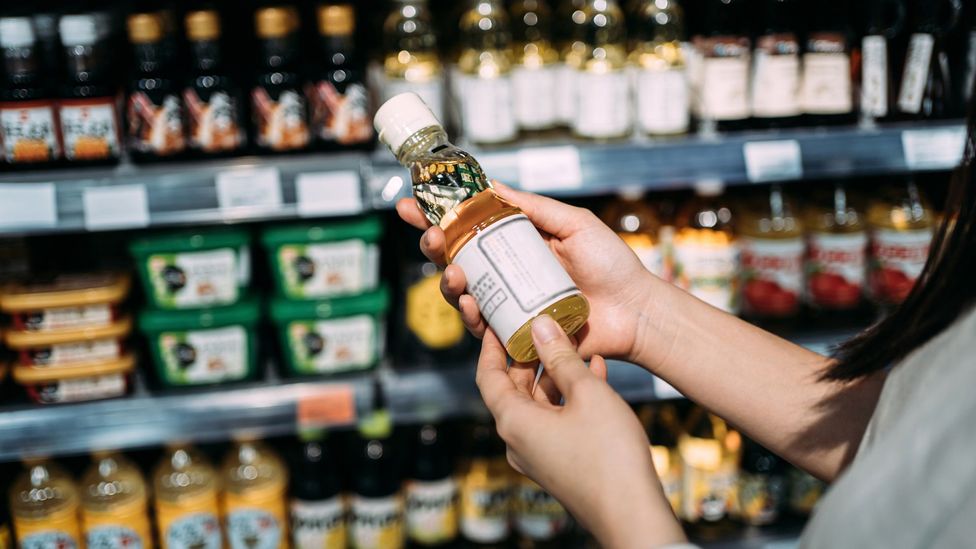
Vegetable oils usually comprise differing amounts of saturated fat, monounsaturated and polyunsaturated fatty acids (Credit: Getty Images)
But Taylor Wallace, an offshoot professor in the Department of Nutrition and Nutrient Studies at George Mason University in Virginia, argues lauric acrid is not as healthy as some claims suggest. It is categorised equally a C12 fatty acid, significant it has 12 carbon atoms, and that puts information technology at the limit of the definition of a medium chain fatty acid.
"C12s are similar long chain fat acids that got categorised into medium chain," says Wallace. "About seventy% of C12s human action as long chain fatty acids, which are transported to the liver." Longer chain fat acids are more probable to be stored in the liver as fatty and could, over fourth dimension, cause health issues such as nonalcoholic fatty liver disease.
Instead, experts advise opting for an oil lower in saturated fat, and higher in other types of fats that are healthier in moderation. Polyunsaturated fat, including omega 3 and omega 6, and monounsaturated fat have been plant to lower cholesterol levels and provide essential fatty acids and vitamins. They're establish in many different types of vegetable oils, although the exact corporeality depends both on the plant and the engineering science process used during their production.
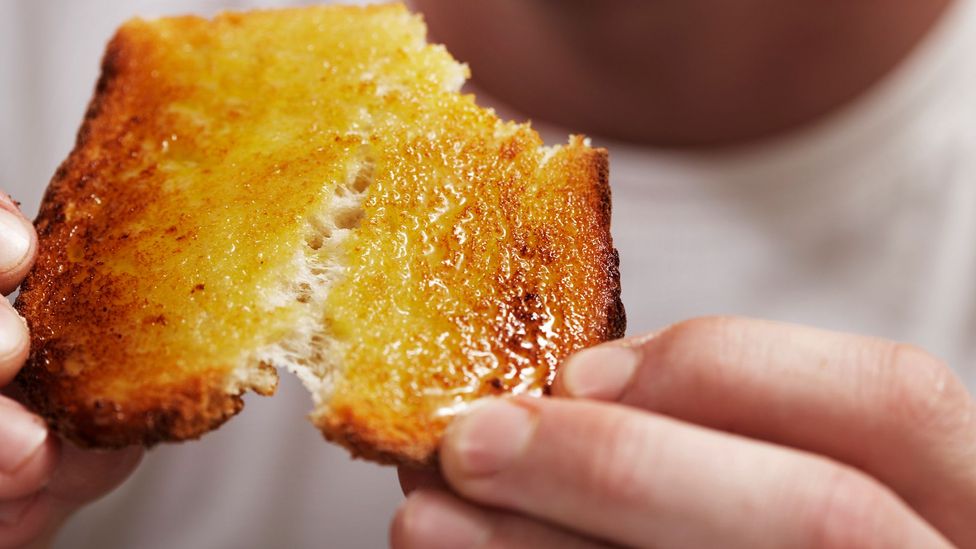
Replacing saturated fats such as butter with olive oil could lead to reduced take chances of developing center affliction (Credit: Getty Images)
"Almost studies indicate that foods higher in monounsaturated and polyunsaturated fats are associated with lower risk of cardiovascular disease," says Lichtenstein. "It's recommended we replace sources of unsaturated fat with polyunsaturated fat, primarily plant-based oils, and nuts and seeds," she says.
1 observational study associated replacing saturated fat with olive oil, for instance, with a lower risk of eye illness. Substituting butter, margarine, mayonnaise or dairy fatty with olive oil reduced the gamble past 5 to seven%.
Marta Guasch-Ferre, writer of the study and a research scientist Harvard University's TH Chan School of Public Wellness's nutrition department in Boston, analysed the health and diets of more than than 100,000 people over 24 years, and found that those with college intake of all types of olive oil had a 15% lower risk of middle disease.
Olive oil's health benefits can partly be attributed to its monounsaturated fatty acids, which contain vitamins and minerals, and polyphenols, micronutrients derived from plants.
"But it's not just that you're adding olive oil into the diet, just that olive oil is substituting other unhealthier fats," says Guasch-Ferre.
Olive oil, which is made past burdensome olives and separating the oil from their pulp, is renowned for being the healthiest of plant oils. One review of inquiry establish olive oil has beneficial effects on gut microbiota and centre disease, and that extra virgin olive oil tin be beneficial in preventing cancer and type 2 diabetes.
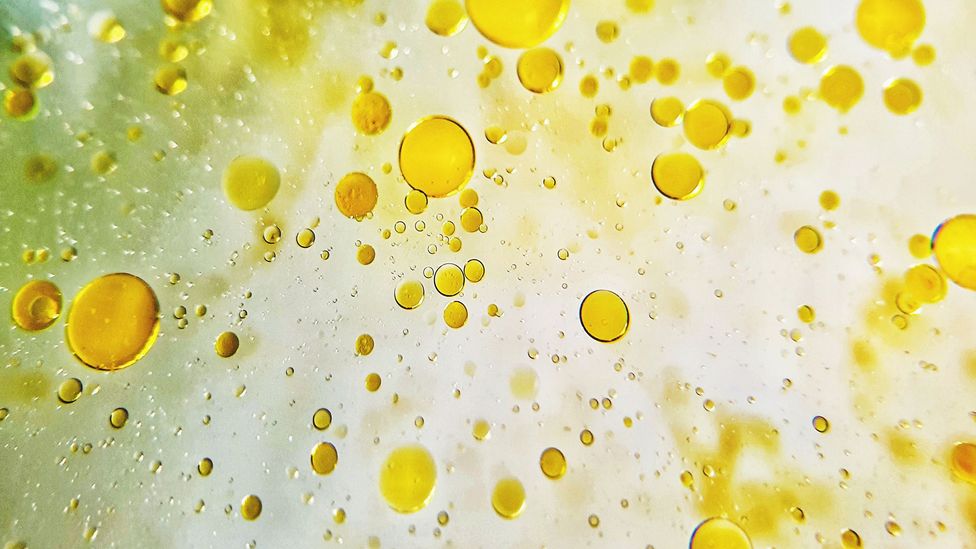
The smaller short concatenation and medium chain fatty acids in some vegetable oils are dissolved in the blood rather than being stored in the liver (Credit: Getty Images)
"The monounsaturated fatty acids and compounds found in olive oil help prevent noncommunicable diseases, not through whatever special mechanisms, merely because our torso needs them," says Francisco Barba, professor at the University of Valencia's preventive medicine and public health department in Spain.
Olive oil is synonymous with the Mediterranean diet, which is high in fruit, vegetables and legumes, and low in saturated fat, and is associated with a reduced take chances of heart disease, despite the loftier fat content.
"What makes the Mediterranean nutrition different from other types of healthy diets is olive oil," Guasch-Ferre says. "Near other components – nuts, fruit and vegetables – are parts of numerous diets, including plant-based."
However, some research suggests these health benefits could be partly driven by other components in the diet, rather than olive oil. Ane review of evidence found that the but benefit of olive oil independent of the Mediterranean nutrition was its power to enhance levels of beneficial cholesterol HDL.
Researchers reviewed 30 studies where participants' diets were altered to test the effects of olive oil, and found that the Mediterranean diet led to lower glucose levels and higher LDL compared to the Western diet. Intervening that diet with olive oil, where information technology had a high polyphenol content, farther increased HDL.
However, consuming olive oil past following the Mediterranean diet was associated with improved glucose levels, which is associated with a greater risk of developing type 2 diabetes if it is too loftier. It likewise reduced the level of triglycerides, a blazon of fat in the blood, and LDL cholesterol levels.
These studies tested numerous types of olive oil, but some inquiry has institute that extra virgin olive oil is associated with the most wellness benefits, including a possible lower risk of heart disease.
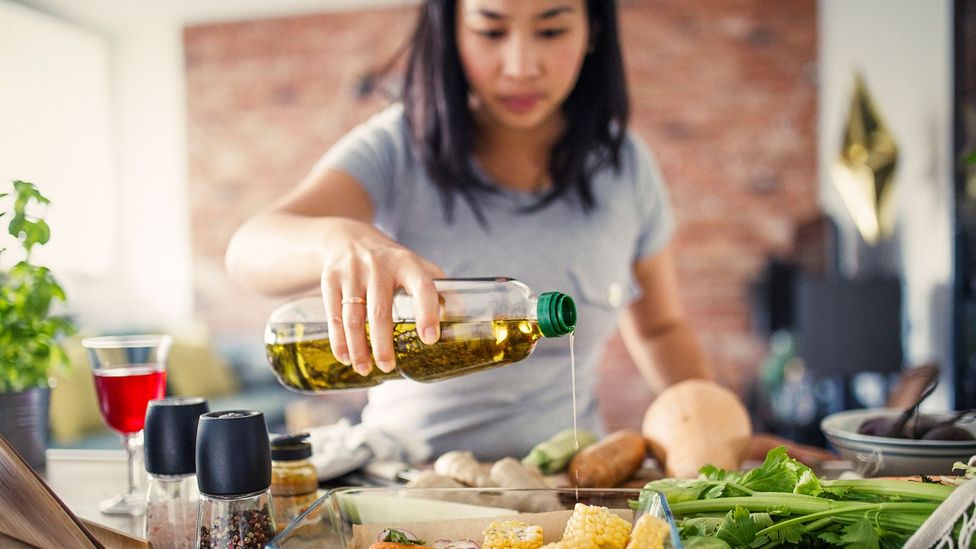
Experts suggest opting for an oil lower in saturated fat, and higher in other types of fats that are healthier in moderation (Credit: Getty Images)
Extra virgin olive oil is rich in antioxidants and vitamin E, and researchers have constitute that it's better at protecting against LDL cholesterol than other types of olive oil. Other types of olive oil are candy after the oil is extracted, which causes them to lose some nutritional qualities.
Extra virgin olive oil, however, has a lower fume betoken, which means it starts to fume at a lower temperature, and in recent years at that place take been concerns that this could release harmful compounds, and that some of its benefits are lost through the heating process.
"Actress virgin olive oil is especially beneficial when it's not cooked, only even under cooking it has a very loftier percentage of monosaturated fat acids," says Barba.
Recent studies have shown that extra virgin olive oil is safety to utilise for cooking. Researchers carried out a number of experiments monitoring actress virgin olive oil as it cooked at 120C (248F) and (338F) on a pan for different lengths of time. They institute that temperature, but non fourth dimension, had some upshot on the polyphenol content in the oil.
In 2011, the European Food Rubber Authority concluded that makers of olive oil can say information technology reduces oxidative stress – an imbalance of free radicals and antioxidants in the body – and protects cells and LDL cholesterol from oxidative damage, which tin can age cells. The researchers conveying out the experiments constitute that actress virgin olive oil used for cooking withal falls within the guidelines for the health claim.
Lichtenstein argues that olive oil doesn't take any unique properties aside from what you'd normally expect from an oil high in monounsaturated and polyunsaturated fats. But what is clear is that the evidence supports using this and other vegetable oils instead of saturated fats, but to limit our intake of oil in general.
"The message isn't to add lots of oil because we think it's good for us, considering that's just calculation lots of calories," she says.
"One time we shift the residual of saturated fatty to unsaturated fat acids, we should then exist able to cull the oil nosotros adopt."
--
Join one one thousand thousand Future fans by liking us on Facebook , or follow u.s. on Twitter or Instagram .
If y'all liked this story, sign up for the weekly bbc.com features newsletter , called "The Essential List". A handpicked selection of stories from BBC Future, Culture, Worklife, and Travel, delivered to your inbox every Fri.
Source: https://www.bbc.com/future/article/20200903-which-cooking-oil-is-the-healthiest